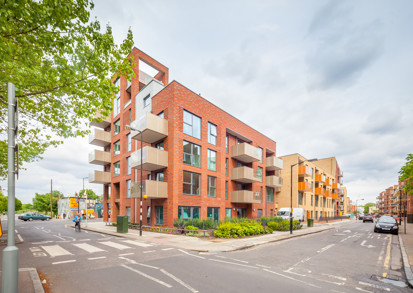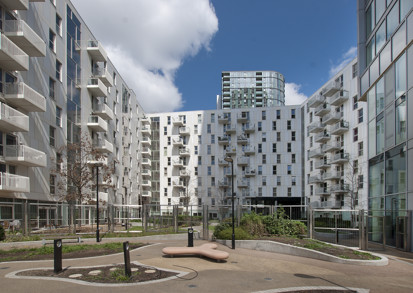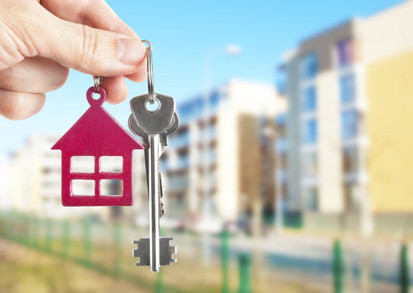Your service charge statement includes many different types of costs and services. This glossary explains what each term means so you can understand exactly what you're paying for and why.
If you see any of these terms on your statement and want to know more, you can look them up here. We've organised them by type of service to make it easier to find what you're looking for.
You may not pay towards all of these costs - this depends on your lease or tenancy agreement and what services your property receives. Use this as a reference guide for any terms that appear on your statement.
Utilities cover the cost of gas, water, and electricity for shared areas of your building or estate, such as powering lifts, lighting hallways, and heating communal spaces. All residents contribute to these costs through their service charges, and if you receive Housing Benefit or Universal Credit, these costs may be covered by your benefits.
In some larger schemes with district heating systems, you may pay for your personal heating and hot water through a billing agent we've appointed rather than directly to an energy supplier.
- Gas - The cost of gas for shared areas in your building, such as heating systems or equipment in plant rooms that serve the whole building.
- Water - The cost of water used in shared areas, for example for cleaning communal spaces or watering gardens.
- Electricity - The cost of electricity for shared areas like lighting in hallways, powering lifts, automatic gates, or communal sockets.
- Communal telephone services - The cost of telephone lines needed for building systems, such as lift emergency phones or site office phones.
Door entry maintenance - The cost of maintaining and repairing the entry systems for your building (like intercoms and electronic locks).
Estate maintenance - The cost of maintaining outdoor areas across your estate, including car parks, playgrounds, and grounds.
Playground maintenance - The cost of maintaining and repairing play equipment in shared outdoor areas.
Car park maintenance - The cost of maintaining car parks, including lighting, ventilation systems, and fire safety equipment in underground car parks.
Emergency lighting maintenance - The cost of maintaining emergency lighting systems in shared areas (the lights with small green indicators that work during power cuts).
Gate maintenance - The cost of maintaining and repairing automatic or mechanical gates on your estate.
Plant maintenance - The cost of maintaining building systems and equipment, including:
- Cold water system maintenance - Maintaining water pumps and systems that supply water to your home
- Mansafe systems maintenance - Maintaining safety equipment that protects workers from falling when they work on roofs
- Lightning protection maintenance - Maintaining equipment that protects your building from lightning strikes
- Water hygiene maintenance - Testing water systems for safety (including Legionella testing) and maintaining outside taps
- Communal plant maintenance - Maintaining equipment that provides heating and hot water to your home
- Water and sewage pump maintenance - Maintaining pumps that boost water pressure in your building and maintaining the private sewage system that isn't part of the mains system that Thames Water maintains
- Solar panel maintenance - Maintaining solar panels connected to your building
Mechanical and electrical equipment maintenance - Maintaining various building systems like lifts, door entry systems, emergency lighting, and electronic gates. This includes MVHR maintenance which is maintaining ventilation systems that circulate fresh air throughout your home (Mechanical Ventilation Heat Recovery).
Component maintenance - Maintaining non-electrical building features like TV aerials, lightning protection equipment, and solar panels.
Day-to-day repairs - The cost of completing everyday repairs in shared areas.
Bulk refuse removal - The cost of removing large items of rubbish left in bin areas or around your estate that will not be removed through usual refuse collections.
TV aerial maintenance - The cost of maintaining communal TV aerials for your building, including upgrading to digital systems.
Fire servicing and maintenance - The cost of maintaining fire safety systems that keep you and your building safe.
Fire risk assessments - Regular safety checks of your building that are required by law.
Fire safety maintenance - Regular maintenance of fire equipment to make sure it works properly.
Building safety reports - Reports about safety risks that must be sent to the government. This is only required for high-risk buildings in line with government legislation.
Warden alarms - Personal emergency call systems (usually only in supported housing schemes).
- Lift Maintenance - This covers the cost of periodic maintenance / servicing of the lifts at your block or scheme.
Site security - The cost of hiring security staff for your building or estate.
CCTV maintenance - The cost of maintaining security cameras and related systems.
Pest control - Treatment for pest problems in shared areas. How this is charged depends on what caused the problem:
- Building faults - Renters don't pay, but leaseholders contribute through service charges
- Resident behavior - The resident responsible pays directly
- Natural occurrence with spread risk - All residents contribute through service charges
- Communal areas - All residents contribute through service charges
Catering - The cost of maintaining kitchen equipment in schemes that provide meals.
Laundry and linen - The cost of laundry services (usually only in supported housing schemes).
Community contribution - Money set aside to improve your local community, such as funding community cafes or events.
Council tax - When we rent out houses with multiple tenants, we pay council tax and include this cost in service charges.
Management fee - Our charge for providing property management services, including staff costs, IT systems, and general administration.
Stock condition surveys - Surveys to check the condition of your building and plan future maintenance work. These help us work out how much it will cost to replace things in the future and save the right amount of money in the reserve fund.
Reserve fund/sinking fund - Money saved for future major repairs or replacement of components or plants on your building or estate.
Transfer to cyclical fund - Money saved for planned future work like replacing windows or redecorating.
Transfer to sinking fund - Money saved for unexpected major costs, like emergency tree removal.
Audit fees - The cost of having accountants check that our service charge accounts are accurate and properly maintained.
Staff salaries - The cost of on-site staff like caretakers and concierge, including temporary agency staff.
External managing agent (EMA) - A separate company employed to manage your building's services. This EMA may have been appointed by us or by a superior landlord.
Sometimes Notting Hill Genesis doesn't own the building you live in outright, or we might use another company to manage your building for us. When this happens, we work with an "external managing agent" or "EMA".
How EMAs affect your service charges:
- If we don't own the freehold that means a third party owns the building and is involved in managing the shared areas.
- How you pay depends on your lease. You might pay the EMA directly, or pay us and we pass the money on to them.
- On larger estates we might own the building but ask an EMA to look after it for us. In In these cases, you usually pay the EMA directly.
Your lease will tell you exactly how you should pay your service charges when an EMA is involved.
Resident management company (RMC) - A non-profit company run by leaseholders who take responsibility for maintaining their building.
Right to manage (RTM) - The legal right for leaseholders to apply to manage their own building through a company they set up.
Cleaning - The cost of cleaning inside and outside your building, including shared areas, windows, and removing graffiti.
Window cleaning - The cost of cleaning windows in shared areas of your building.
Graffiti removal - The cost of removing graffiti from your building.
Communal bins - The cost of hiring large shared bins, usually from your local council.
Gardening - The cost of maintaining outdoor areas including grass cutting, plant care, and small tree work (under 2 meters high).
Tree works - The cost of specialist tree maintenance and removal.
Building insurance - The cost of Notting Hill Genesis insuring your building. Only leaseholders pay for building insurance through their service charge - tenants don't pay for this as they don't own the building structure. However, everyone (both tenants and leaseholders) needs their own contents insurance to cover personal belongings.
Service charge apportionment - Your percentage share of costs, calculated according to your lease or tenancy agreement. This might be based on:
- The size of your home
- How many bedrooms you have
- Which services benefit your property
Your tenancy or lease agreement may specify that your share is a fixed cost. You might pay into different cost groups (estate, block, and core), each with different percentage shares.





